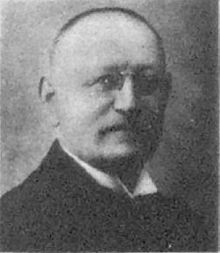Hans of Troilo
Hans von Troilo (born November 25, 1865 in Glogau , Province of Silesia , † January 21, 1934 in Pförten ) was a German entrepreneur and politician (DNVP).
Life
Troilo completed military training in the Prussian cadet houses in Bensberg, Wahlstatt and Lichterfelde. On April 15, 1884 he came to the 48th Infantry Regiment as a characteristic porteef ensign. On September 16, 1885, he was promoted to lieutenant. As a lieutenant, he was 19th in the Infantry Regiment 52, as a captain up to and including major and battalion commander in Infantry Regiment during World War II from 1914 to 1919 as a regimental commander of Infantry Regiment 53, was in war the Order Pour le Mérite and was on 27 January 1917 promoted to lieutenant colonel.
After the war he took over the management of the mines and brickworks of the Jeschke brothers in Teuplitz ( Sorau district ), which he inherited as a co-owner . In the same year he worked in the Sorau-Forst district association of the German National People's Party (DNVP). In 1923 he was on the board of this association as chairman of the western half (forest and surrounding area). In the same year he also joined the Stahlhelm, Bund der Frontsoldaten , for which he was Gauführer of the Großgau Lausitz in 1927. From Stahlhelm he was also put up for election as a candidate for the Reichstag in addition to being nominated by the industrial committee of his electoral association.
As a member of the DNVP, he was a member of the Reichstag in Berlin during the fourth electoral term .
Honors
The Troilokaserne in Bonn - Duisdorf , built in 1936, was named after him. She served as infantry - barracks and was after the Second World War, first by Belgian occupation forces and later by German federal authorities used.
Fonts
- Self-employment-self-employment. Contemporary recruit training for the ... , 1916.
- The 5th Westphalian Infantry Regiment No. 53 in World War I 1914-1919 , 1924.
- Christian-National-Social! Goals and ways of the DNVP , 1928.
Web links
- Literature by and about Hans von Troilo in the catalog of the German National Library
- Hans von Troilo in the database of members of the Reichstag
| personal data | |
|---|---|
| SURNAME | Troilo, Hans von |
| BRIEF DESCRIPTION | German entrepreneurs and politicians (DNVP), MdR |
| DATE OF BIRTH | November 25, 1865 |
| PLACE OF BIRTH | Glogau , Province of Silesia |
| DATE OF DEATH | January 21, 1934 |
| Place of death | Gates |
